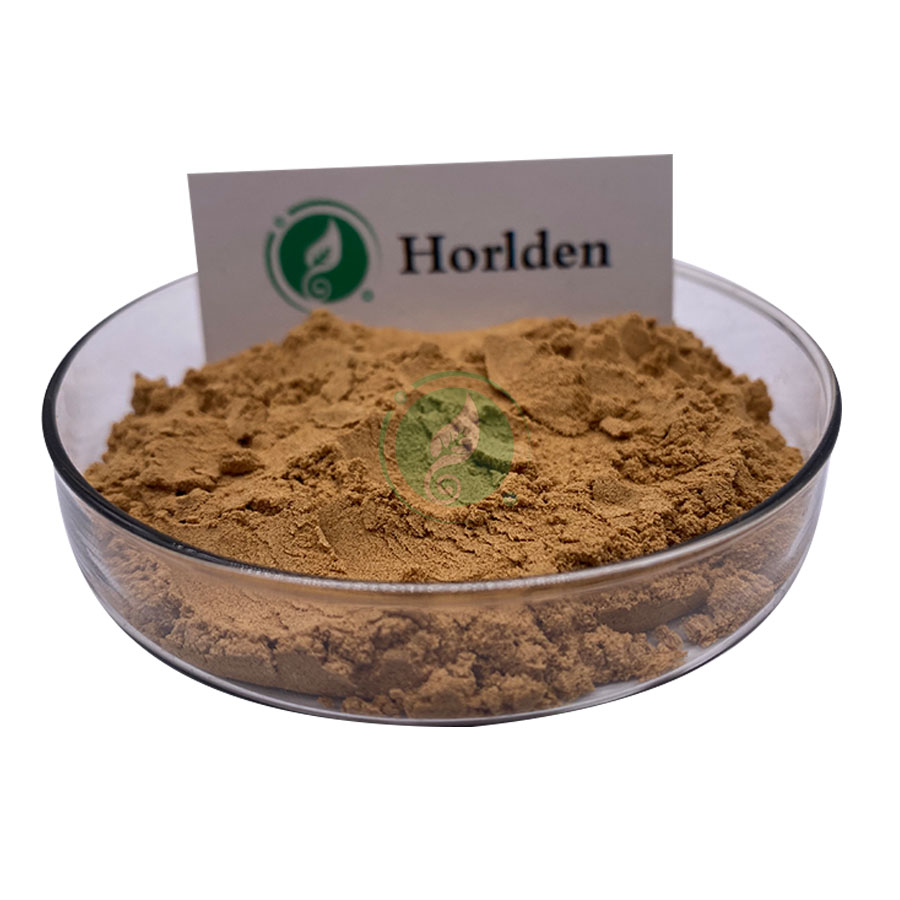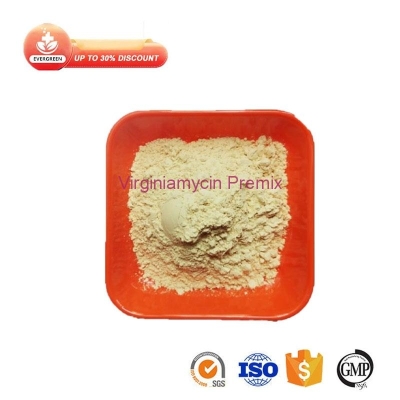Study on the application of traditional Chinese medicine feed additive in livestock and poultry production
-
Last Update: 2008-11-03
-
Source: Internet
-
Author: User
Search more information of high quality chemicals, good prices and reliable suppliers, visit
www.echemi.com
Introduction: in recent years, with the continuous development of modern breeding industry, feed additives are almost used in all kinds of livestock and poultry production processes, and have become one of the three pillars of raw materials for compound feed industry The use of additives plays a great role in improving the nutritional efficiency and production performance of livestock and poultry However, most of the feed additives are mainly composed of synthetic chemicals, antibiotics or hormones The continuous use of additives is easy to produce residues and drug resistance in livestock Even in meat, eggs, milk and other animal products, there are residues of drugs and toxins, which may lead to cancer, mutation and distortion Therefore, it is harmful to human health, and its excreta will cause environmental pollution These problems have attracted worldwide attention However, the traditional Chinese medicine feed additive has been paid more and more attention at home and abroad because of its safety, low toxicity, no residue, no drug resistance and low price The use of traditional Chinese medicine feed additive conforms to the current trend of "green agriculture" in the world and has a broad development prospect At present, a lot of scientific research and practical work have been carried out in the field of feed industry and animal husbandry and veterinary science at home and abroad, and good results have been achieved The results showed that traditional Chinese medicine, as a feed additive, can not only regulate the physiological function of the body and promote metabolism, but also has the functions of clearing away heat and toxin, anti-bacterial and anti-inflammatory, insect repellent and enhancing immunity It can accelerate the growth speed, improve production performance and improve product quality Effect The following is a comprehensive description of the research trends of Chinese medicine feed additives from the following aspects 1 The effect of Chinese medicine feed additive on weight gain and feed conversion rate Khanov M.t et al (1972) reported that the extract of Dangshen root can promote the growth of rabbits and increase the body weight by 23%; 1981 Soviet Union Journal reported that the weight of rabbits in the experimental group increased by 27%, piglets, lambs and chickens by 12%; zhangjialin et al (1991) reported that the daily weight of rabbits fed with Maifanshi increased by 23% compared with the control group 18% (P < 0.05), the feed conversion rate increased by 16.24%, and the cost of weight gain per kilogram decreased by 0.16 yuan, the effect was obvious; sun suling (1995) reported that the weight gain increased by 44.23% (P < 0.01), the feed weight ratio decreased by 11.63% (P < 0.05), and the economic benefit was improved; Jiang qianyun (1997) reported that 1.0% Astragalus was added to the meat rabbit diet, Daily gain, feed conversion rate and economic benefits were significantly improved Meng Zhaoju (1994) reported that the long haired rabbit feed additive made from Atractylodes rhizome, orange peel, tangerine peel, green leaf, Pulsatilla chinensis, Fructus schisandrae chinensis, purslane, plantain and licorice can increase daily gain by 19% (P<0.01) and low incidence rate and no death The yield of the rabbit can be increased by 15.6% (P<0 05), the weight to weight ratio decreased by 11% and 13.5% respectively; Xu Ming (1997) made 1.5 herbs of Radix Codonopsis, astragalus, Atractylodes macrocephala, tangerine peel, Atractylodes latifolium and hawthorn, 1 herbs from plantain, Folium Isatidis, Pulsatilla chinensis and liquorice, and incidence rate of daily gain was 14.01% (P<0.05), and feed conversion rate increased by 18.15%, and the incidence rate increased by 18.15% Drop There are many reports on the application of traditional Chinese medicine feed additive in various kinds of livestock and poultry, and the results are consistent These reports show that proper traditional Chinese medicine feed additive can produce good effects on the weight gain and feed conversion rate of livestock and poultry 2 The influence of the growth promoting effect of Chinese medicine feed additive on the blood index the report of the influence of Chinese medicine feed additive on the blood index is few and mainly concentrated on pigs, chickens and cattle, some of them have good effect, some of them have no significant difference, but they have no adverse effect Specific test indicators include: 2.1 routine blood test to detect red blood cells, white blood cells, hemoglobin, total protein, albumin / globulin, blood sugar, total cholesterol and other indicators to reflect the nutritional status of the body 2.2 the liver function was measured to reflect the metabolism function of the body 2.3 serum calcium, inorganic phosphorus, magnesium and other indexes were detected by electrolytes in the blood to reflect the salt balance of the body 2.4 the serum levels of growth hormone, T3, T4, insulin and testosterone were measured to reflect the metabolic regulation of the body All of the above hormones are directly related to the growth of animals, and the change of their concentrations can provide evidence for the change of the growth rate of animals from the perspective of Endocrinology 3 The effect of traditional Chinese medicine feed additive on the quality of muscle and fur it is reported that the meat quality of broiler can be improved by using garlic, capsicum, nutmeg, pepper, clove, ginger and other spices The meat quality of broiler and pig can be improved by using pine needle powder In 1991, science news of Japan reported that when animals were fed spicy feed before slaughter, their meat not only tasted better, but also kept fresh longer Some experiments have shown that pine needle powder, Glauber's salt and zeolite can significantly improve the wool yield of rabbit; earthworm powder can significantly improve the quality of rabbit hair; Ruyi crystal, a Chinese herbal medicine made of hawthorn, yam and ginseng, can significantly improve the wool yield and the quality of rabbit hair Feeding Atractylodes macrocephala can make fur soft and glossy 4 Pharmacological study on the effect of traditional Chinese medicine feed additives on the immune function of human body shows that many Chinese herbs can enhance the immunity of human body, induce interferon, adrenocortical hormone, and have the function of antibiosis and antiviral For example, astragalus, dangshen, ginseng, Houttuynia cordata, Aristolochia, acanthopanax senticosus and other drugs can enhance the phagocytic function of macrophages: Astragalus, wormwood leaf, liquorice, Poria cocos, yam, honeysuckle, dandelion, indigo naturalis, Schisandra, etc can induce the body to produce interferon; Astragalus, acanthopanax senticosus, Ligustrum, lily, epimedium, ginseng and other drugs can enhance cell immunity and promote lymphocyte transformation Change In addition, some drugs have the effect of humoral immunity, some drugs have the effect of allergy, some drugs have the effect of complement and lysozyme Fang Weihuan (1991) reported that 22 kinds of traditional Chinese medicine, such as Coptis, have different degrees of inhibition on Newcastle disease virus, 16 kinds of traditional Chinese medicine can significantly inhibit the hemagglutination of virus and reduce the formation of virus plaque In addition, it is reported that adding 1% Chinese medicine (safflower, astragalus, Gynostemma pentaphyllum, Folium Isatidis, Polygonum multiflorum, etc.) to the diet of chicks can increase the relative weight of normal bursa of Fabricius in chicks and make the swelling of bursa of Fabricius not obvious after infection (IBD) In a word, adding appropriate Chinese herbal medicine to the feed can improve the body's resistance to disease, reduce various stress reactions and diseases, so that the livestock and poultry can grow healthily and gain weight quickly 5 Chemical components of traditional Chinese medicine the chemical components of traditional Chinese medicine are very complex, generally including alkaloids, glycosides, volatile oils, internal lipids, tannins, resins, organic acids, proteins and amino acids, oils, pigments and inorganic components Some of them are commonly shared by general higher plants, such as sugar, oil, protein, resin, pigment, inorganic salts, etc., which mainly play a nutritional role and have no special role in clinical, so they are called invalid components Some components are specific compounds of some plants, which have significant physiological activities and have special functions in medical treatment, such as alkaloids, glycosides, volatile oils, tannins, etc., but the invalidity and effectiveness are not absolute, depending on the specific medicinal materials and uses In recent years, there has been a new progress in the analysis of effective components of Chinese medicine additives, which provides a more reliable basis for further study of the effect of Chinese medicine additives For example, Kong Qinglei, etc used modern instruments and methods to systematically determine 20 ingredients of 619 commonly used Chinese herbal medicines that are beneficial to people and animals It is reported that Astragalus contains saponins, polysaccharides, flavonoids, amino acids, trace elements, coumarin, folic acid, bitter element, choline, betaine, linoleic acid and other chemical components There are 57 kinds of major, trace and rare earth elements in Maifanshi, among which there are more than 30 kinds of elements beneficial to human and animals The content of fatty acids, carotenoids, fat soluble vitamins, VC, 17 kinds of amino acids and rich proteins in the pulp residue of seabuckthorn were determined The content of metal elements in 48 kinds of Chinese herbal medicines was determined by seihiko Matsuda et al The highest content of Fe was as high as 2400ppm in safflower, 620ppm in cinnamon, 560ppm in Coptis, and 4.0ppm in Chaihu According to the analysis, pine needle powder contains 6.33% amino acid, vc522mg / kg, vb13.8mg/kg, vb217.2mg/kg, ve70 mg / kg and carotene 121.8mg/kg There are many similar studies, different components of different traditional Chinese medicine will bring different effects 6 The purpose of the prescription, compatibility, dosage form and dosage of traditional Chinese medicine feed additive is to promote growth, so each prescription should reflect the role of enhancing metabolism Under this premise, the prescription should have strong pertinence, reasonable structure, coordinated function and consistent function trend The taste of the medicine should be concise, generally between 2 and 6 It should be noted that the taste of the medicine should be small and sufficient, accounting for a certain proportion in the feed, so as to concentrate the efficacy The prescription should be based on the principle of application of traditional Chinese medicine, such as monarch, minister, assistant and emissary, so as to prevent incompatibility, distinguish the main medicine and auxiliary medicine, and play a synergistic role In general, pigs, birds and other single stomach animals use powder, and generally do not need carrier, to directly mix the powder can be The dosage range of traditional Chinese medicine additive is wide Generally speaking, the dosage of single drug is large while that of compound drug is light The dosage of traditional Chinese medicine compound additive can generally account for 0.5-2.0% of the diet If the dosage is too small, it can not achieve the purpose of weight gain If the dosage is too large, it will cause waste and affect the balance of yin and Yang of the body, it can not achieve the purpose of weight gain China has a vast territory, a wide variety of traditional Chinese medicine, rich resources, cheap prices, local materials, with the unique conditions for the development and utilization of traditional Chinese medicine feed additives It is reported that about 500 of the more than 1000 kinds of traditional Chinese medicine commonly used by veterinarians have been used as feed additives Many kinds of traditional Chinese medicine feed additives have been tested and developed in various places, which have been used in various livestock and poultry production As a feed additive, traditional Chinese medicine has a broad development prospect Liu Xudong, male (1953.4 ~), from Pingshan County, Hebei Province, junior college degree, senior veterinary physician, veterinary medicine GMP certification expert of the Ministry of agriculture, Deputy Secretary General of Hebei Animal Health Products Association, Deputy Secretary General of Hebei animal husbandry and Veterinary Society, is now working in Hebei veterinary medicine supervision Institute, engaged in veterinary medicine feed supervision and management He has published many scientific and technological papers in national and provincial professional journals, and participated in the preparation of "safety and health control of agricultural products in international trade", about 440000 words Liu Yifei, female (1972.2 ~), born in Tangshan City, Hebei Province, is a senior animal husbandry teacher with a postgraduate degree Now she works in Hebei veterinary drug supervision institute, and is engaged in the supervision and inspection of veterinary drugs, feed and pollution-free animal products He has published more than ten scientific and technological papers in national and provincial scientific and technological journals
This article is an English version of an article which is originally in the Chinese language on echemi.com and is provided for information purposes only.
This website makes no representation or warranty of any kind, either expressed or implied, as to the accuracy, completeness ownership or reliability of
the article or any translations thereof. If you have any concerns or complaints relating to the article, please send an email, providing a detailed
description of the concern or complaint, to
service@echemi.com. A staff member will contact you within 5 working days. Once verified, infringing content
will be removed immediately.







